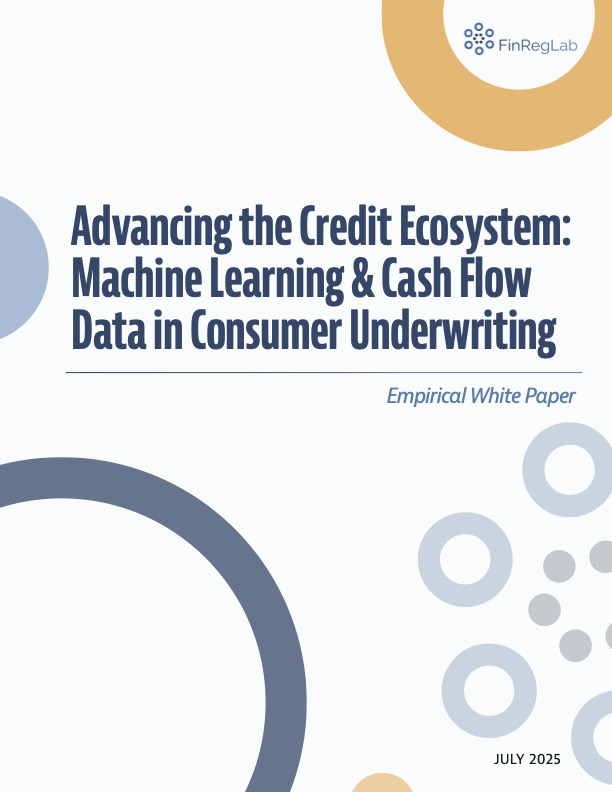Publications
Advancing the Credit Ecosystem: Machine Learning & Cash Flow Data in Consumer Underwriting
Empirical White Paper
Report Summary
This empirical white paper assesses the impacts on model predictiveness and credit access of both adopting machine learning techniques and incorporating electronic bank account information (often called cash flow data) in consumer underwriting models.
The evaluation was conducted by building a series of models based on an anonymized dataset that combines data from one of the main three nationwide credit bureaus with bank account information compiled by a data aggregator, and then comparing the models’ predictions against actual credit performance on new accounts opened in 2018-2019.
Across all models built for the study, the machine model that combined credit bureau data with cash flow data was the most predictive overall and across all subgroups. It also had the highest approval rates overall and for most subgroups at most risk thresholds, while also producing relatively low false positive rates (approvals of consumers who went on to default). The machine learning model built using only credit bureau data generally ranked second on both predictiveness and access.

Acknowledgments
This empirical white paper expands on FinRegLab’s prior quantitative research on the use of cash flow data for credit underwriting in both consumer and small business markets and managing explainability and fairness concerns in connection with machine learning underwriting models. These prior reports, along with related data science, market, and policy analyses, are available at https://finreglab.org/category/projects/.
We would like to thank members of our project advisory board: Jay Budzik, Fifth Third Bank; Vickey Chang, Equifax; and Conrod Robinson, FinRegLab Advisor. Keith Ernst, Federal Deposit Insurance Corporation, also participated as a regulatory observer.
Thanks also to the following individuals who provided feedback in connection with this project and the report:
Lastly, we would like to acknowledge Zishun Zhao for conducting the empirical analysis, Zishun Zhao and Kelly Thompson Cochran for writing this report, and other members of the FinRegLab team who worked on various elements of this research project, including Ali Bagherpour, Drew Bluethmann, and Sarah Davies.
With Support From
JPMorgan Chase & Co.
(NYSE: JPM) is a leading financial services firm based in the United States of America (“U.S.”), with operations worldwide. JPMorganChase had $4.4 trillion in assets and $351 billion in stockholders’ equity as of March 31, 2025. The Firm is a leader in investment banking, financial services for consumers and small businesses, commercial banking, financial transaction processing and asset management. Under the J.P. Morgan and Chase brands, the Firm serves millions of customers in the U.S., and many of the world’s most prominent corporate, institutional and government clients globally. Information about JPMorgan Chase & Co. is available at www.jpmorganchase.com.
Capital One Financial Corporation
(www.capitalone.com) is a financial holding company which, along with its subsidiaries, had $367.5 billion in deposits and $493.6 billion in total assets as of March 31, 2025. Headquartered in McLean, Virginia, Capital One offers a broad spectrum of financial products and services to consumers, small businesses, and commercial clients through a variety of channels. Capital One, N.A. has branches located primarily in New York, Louisiana, Texas, Maryland, Virginia, New Jersey and the District of Columbia. A Fortune 500 company, Capital One trades on the New York Stock Exchange under the symbol “COF” and is included in the S&P 100 index.
Related Publications
-
This empirical paper analyzes the impacts on predictive accuracy and credit access of incorporating electronic cash-flow data into small business underwriting models using data from two fintech lenders that lend to a broad spectrum of customers.
-
This empirical white paper assesses the capabilities and limitations of available model diagnostic tools in helping lenders manage machine learning underwriting models. It focuses on the tools’ production of information relevant to adverse action, fair lending, and model risk management requirements.
-
We conducted an independent analysis of data from six firms that use cash-flow metrics to assess consumer and small business applicants. Using loan level performance data, we evaluated the information’s implications for predictiveness, inclusion, and fairness.
About FinRegLab
FinRegLab is an independent, nonprofit organization that conducts research and experiments with new technologies and data to drive the financial sector toward a safe and responsible marketplace. The organization also facilitates discourse across the financial ecosystem to inform public policy and market practices. To receive periodic updates on the latest research, subscribe to FRL’s newsletter and visit www.finreglab.org. Follow FinRegLab on LinkedIn.
FinRegLab.org | 1701 K Street Northwest, Suite 1150, Washington, DC 20006


